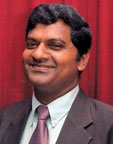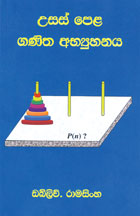|
Mathematical Induction :
Puzzle baffles even teachers
by Ranga CHANDRARATHNE
 |
|
Dr.Ramasinghe presents the book to
President Mahinda Rajapaksa |
In an interview with the Sunday Observer, Prof. W. Ramasinghe spells
out his views on current state of teaching mathematics in Sri Lanka and
his latest publication in Sinhala on Mathematical Induction and its
applications. The book is basically for Advanced Level Students.
Excerpts:
Q: How was the idea of writing a book on Mathematical Induction
conceived?
A: A long time ago, I came to know that a teacher was trying to solve
a problem based on Mathematical Induction.
Since he was not able to solve the problem in A/L Mathematics
Syllabus, he had consulted some Lecturers who wrote a text book on
mathematics.
. As they could not find a solution, he had then consulted those who
were responsible for drafting the A/L question Paper. Since the question
was in Sinhala, some of them refused to answer it.
Some have replied in English medium with a solution using the
material not taught in the AL syllabus.. However, the crustof the matter
was that they also did not know how to solve it. When the teacher
visited another teacher somewhere away from Colombo, he too had refused
to see him. As a result of this incident, I thought of writing a book on
Mathematical Induction.
 |
|
Dr. W. Ramasinghe |
Some professionals entertain an incorrect notion that they know
Mathematics merely because they have studied Mathematics as a subject
for their degrees and they use it. (Some even have special degrees in
Mathematics but they haven't studied Mathematics further). Someone who
studies Physics, Engineering, Statistics or even Economics tend to
presume that they know Mathematics.
Q: How do you consider Mathematics?
A: It is a subject which, in fact, develops logical thinking and
ability to solve complex issues. That's why it is called the language of
science. Even to learn languages such as Sinhala or English, Mathematics
helps because it develops analytical skills. In fact, the last question
of the book is on language issue. For instance, when you say "All that
glitters is not gold", this statement is contradictory. But to see that
contradiction in the statement, one should know Mathematics well.
Q: Is the book only for Advanced Level students?
A: No, though I wrote the book basically for Advanced Level students,
Induction is a principle used even at PhD level. So it is useful for
all. It has a hypothesis which we call Induction Hypothesis.
 |
|
Book on Mathamatical
Induction |
I really don't know how many persons in Sri Lanka know how to write
Induction Hypothesis. This is because there is a couple of persons who
assumed positions at top level as Mathematicians without studying
Mathematics. This has become a disaster. The most dangerous aspect in
Mathematics in comparison to other subjects is that it is very important
to know exactly what you know and what you don't know. Because, in
Mathematics, you have to prove certain hypotheses and if you don't know
what to be proved, then you would not know how to prove it. As a
teacher, I always advise if you don't know, please say that you don't
know it to students. Many think that computers and calculators can do
Mathematics. It is an erroneous notion. Computers can do computing. But
Mathematics is something which demands thinking and analytical skills.
In fact, the basis of logical thinking is mathematics.
Q: What are the objectives of the book?
A: The goal of the book is to make sure that someone, at least, learn
how to write Induction Hypothesis.
It should be very clear. I have dedicated a chapter to talk about
language. Even the punctuation is very important in Mathematics.
Those who teach Mathematics at any level and university level do not
know this. I believe that we are in a position where it is very
difficult to get out of as people have been thinking making calculations
and using the computer is Mathematics.
I presented the first copy of this book to President Mahinda
Rajapaksa because if the President wants to improve teaching of
Mathematics in Sri Lanka, I am willing to help that attempt.
Mathematical induction is a method of mathematical proof typically
used to establish that a given statement is true of all natural numbers.
It is done by proving that the first statement in the infinite sequence
of statements is true, and then proving that if any one statement in the
infinite sequence of statements is true, then so is the next one.
The method can be extended to prove statements about more general
well-founded structures, such as trees; this generalization, known as
structural induction, is used in mathematical logic and computer
science. Mathematical induction in this extended sense is closely
related to recursion.
Mathematical induction should not be misconstrued as a form of
inductive reasoning, which is considered non-rigorous in mathematics. In
fact, mathematical induction is a form of deductive reasoning and can be
quite rigorous. (Wikipedia)
|

